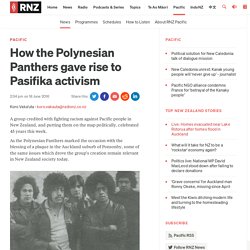

Controlling Pacific Island immigration. Pacific Islanders in New Zealand Regulating the flow and determining the status of Pacific Island migrants became complex when larger numbers came after the Second World War to meet New Zealand’s labour needs.
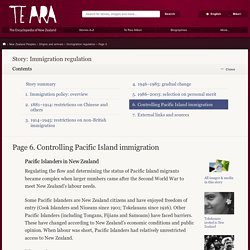
Some Pacific Islanders are New Zealand citizens and have enjoyed freedom of entry (Cook Islanders and Niueans since 1901; Tokelauans since 1916). Other Pacific Islanders (including Tongans, Fijians and Samoans) have faced barriers. These have changed according to New Zealand’s economic conditions and public opinion. When labour was short, Pacific Islanders had relatively unrestricted access to New Zealand. Western Samoans As part of a Treaty of Friendship in 1962, immigrants from Western Samoa were admitted under a quota.
When Pacific Islanders were raided in their beds. They would strike in the dead of night at Auckland's affluent heart.
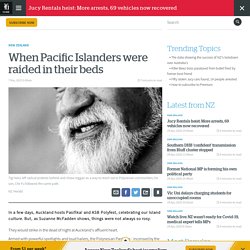
Search Images & Media. Organising against racism, 1970s to early 21st century. New anti-racist groups In the early 1970s new anti-racism organisations were formed to address the consequences of colonisation.
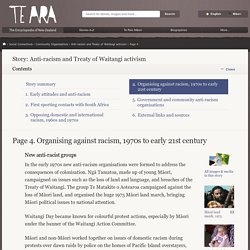
Ngā Tamatoa, made up of young Māori, campaigned on issues such as the loss of land and language, and breaches of the Treaty of Waitangi. The group Te Matakite o Aotearoa campaigned against the loss of Māori land, and organised the huge 1975 Māori land march, bringing Māori political issues to national attention. Waitangi Day became known for colourful protest actions, especially by Māori under the banner of the Waitangi Action Committee. Dawn raids remembered in exhibit 40 years on. People file through the replica 1970s lounge at the exhibition at Pataka, Porirua.
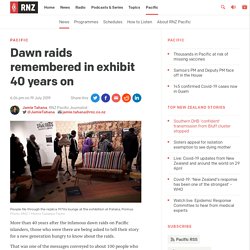
Photo: RNZ / Moera Tuilaepa-Taylor More than 40 years after the infamous dawn raids on Pacific islanders, those who were there are being asked to tell their story for a new generation hungry to know about the raids. That was one of the messages conveyed to about 100 people who braved a frigid Thursday evening in Porirua, gathering to see the opening of a new exhibition. But this time, the doors were opened with a blessing, rather than charged down by police.
Pauline Smith Photo: Supplied They walked to a corner of Pataka, the gallery in Porirua, into a mustard living room; splotchy wallpaper, beige armchairs, a flickering black-and-white television. Dawn Raids - Home. Dawn Raids (New Zealand) Services to Schools. Dawn Raids. Polynesian Panthers : Pacific protest and affirmative action in Aotearoa New Zealand 1971-1981 - Collections Online - Auckland War Memorial Museum. Catalogue Catalogue Catalogue titlePolynesian Panthers : Pacific protest and affirmative action in Aotearoa New Zealand 1971-1981 / edited by Melani Anae ; with Lautofa Iuli and Leilani Burgoyne Type IdentifiersHN930.5 POL (Call Number) ISBN9781775502050 Available inAbstract"Polynesian Panthers records the Pacific rights and social activist movement in New Zealand, told by those who were there.
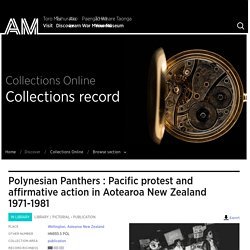
Forming in 1971, the Polynesian Panthers sought to raise consciousness and took action in response to the racism and discrimination Pacific peoples faced in New Zealand in the 1970s and 1980s. The Panthers organised prison visit programmes and sporting and debating teams for inmates; provided a halfway-house service for young men released from prison; ran homework centres; and offered 'people's loans', legal aid and food banks that catered for 600 families at their height. Images and documents akm.collections. Images. Dawn Raids And Polynesian Panthers by Lydean Herman - DigitalNZ. Black power aotearoa. Polynesian Panthers - Polynesian Panthers Party.
Sick of the continuous Police harassment and being branded as the ‘trouble makers’ and ‘criminals’ of society, the younger generation of Pacific Islanders became receptive of the idea of retaliation, but their retaliation emerged with the formation of the Polynesian Panthers Movement.
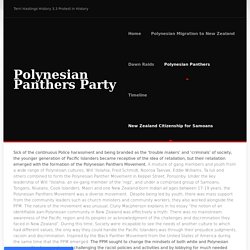
A mixture of gang members and youth from a wide range of Polynesian cultures, Will ‘Ilolahia, Fred Schmidt, Nooroa Taevae, Eddie Williams, Ta Iuli and others combined to form the Polynesian Panther Movement in Keppel Street, Ponsonby. Polynesian Panthers reflect on 45 years. This year marks the 45th anniversary of Auckland-based rights group the Polynesian Panther Party.
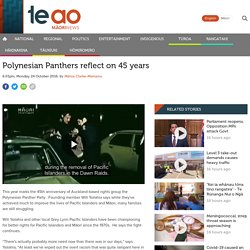
Founding member Will 'IIolahia says while they've achieved much to improve the lives of Pacific Islanders and Māori, many families are still struggling. Will 'IIolahia and other local Grey Lynn Pacific Islanders have been championing for better rights for Pacific Islanders and Māori since the 1970s. He says the fight continues. “There's actually probably more need now than there was in our days,” says 'Ilolahia, “At least we've wiped out the overt racism that was quite rampant here in Grey Lynn.” Will ‘Ilolahia: Once a Panther, always a Panther - E-Tangata. The Polynesian Panther Party, which celebrates its 45th anniversary on June 16, was an activist group led by young, New Zealand-born Pacific Islanders who’d been raised in Auckland’s inner-city suburbs — among them, Will ‘Ilolahia, who was the Panthers’ chairman for its first five years.
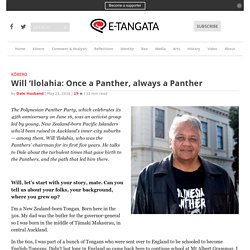
He talks to Dale about the turbulent times that gave birth to the Panthers, and the path that led him there. Will, let’s start with your story, mate. Can you tell us about your folks, your background, where you grew up? I’m a New Zealand-born Tongan. Born here in the 50s. In the 60s, I was part of a bunch of Tongans who were sent over to England to be schooled to become English-Tongans.
I completed my BA in Ohura Prison, in Taranaki, while serving the full six months sentence for assault causing grievous bodily harm. During that time, I was part of the Polynesian Panthers. Did I hear that right? My dad’s name is Molimea ‘Ilolahia. My mother’s name is Lusitania Naufahu. TALANOA: Polynesian Panthers on the Dawn Raids. Polynesian Panthers.
Melani Anae:'We said we weren't going to take it anymore' The Polynesian Panthers at a prtest rally in the 1970s.
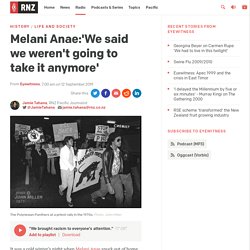
Photo: John Miller It was a cold winter’s night when Melani Anae snuck out of home and headed for Keppell Street, Grey Lynn, where a group of teenagers were gathering to, in their words, start a revolution. “We couldn’t tell our parents, ‘oh we’re just going down the road for a Panther meeting’ with these ex-gang guys,” recalled Anae. “Especially for us girls who were just starting university and were good church girls.” But they were all at the house with a purpose: to push back against racism and to form the group that would become known as the Polynesian Panthers. “We knew this was different,” Anae said. How the Polynesian Panthers gave rise to Pasifika activism. A group credited with fighting racism against Pacific people in New Zealand, and putting them on the map politically, celebrated 45 years this week.
